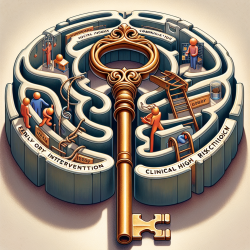The integration of teletherapy and online language exercises offers a promising approach to treating chronic aphasia, as evidenced by the study "Combining Teletherapy and On-line Language Exercises in the Treatment of Chronic Aphasia: An Outcome Study" (Steele et al., 2015). This blog will delve into the key findings of this study and discuss how practitioners can implement these strategies to improve patient outcomes.
Key Findings
The study involved nine participants with chronic aphasia who received both individual and group teletherapy sessions over 12 weeks, supplemented by online language exercises. The outcomes were assessed using various standardized tools, including the Western Aphasia Battery (WAB), Communicative Effectiveness Index (CETI), ASHA National Outcome Measurement System (NOMS), and the Communication Confidence Rating Scale for Aphasia (CCRSA).
- Improvement in WAB AQ: Participants showed a mean improvement of +3.5 points, with a trend towards statistical significance (p = .057).
- Functional Communication: CETI scores improved by +17.8 points (p = .01), indicating significant gains in functional communication.
- Communication Confidence: CCRSA scores improved by +10.4 points (p = .0004), reflecting increased self-confidence in communication abilities.
- High Satisfaction: Participants reported high satisfaction with both teletherapy and online exercises, with mean satisfaction scores above 4 out of 5.
Implementing Teletherapy and Online Exercises
Based on these findings, practitioners can enhance their treatment of chronic aphasia by integrating teletherapy with online language exercises. Here are some actionable steps:
- Leverage Technology: Use platforms like WebEx and GoToMeeting for remote therapy sessions, ensuring good audio and video quality to facilitate effective communication.
- Encourage Independent Practice: Assign online exercises that patients can complete between sessions to reinforce skills and promote neuroplasticity.
- Monitor Progress: Utilize tools that track patient activity and performance on online exercises to adjust treatment plans as needed.
- Focus on Functional Goals: Tailor therapy activities to improve functional communication in real-life situations, enhancing patient engagement and outcomes.
Encouraging Further Research
While this study provides a strong foundation, further research is needed to explore the long-term benefits and optimal configurations of teletherapy and online exercises. Practitioners are encouraged to participate in or initiate studies that continue to refine these approaches.
To read the original research paper, please follow this link: Combining Teletherapy and On-line Language Exercises in the Treatment of Chronic Aphasia: An Outcome Study.










